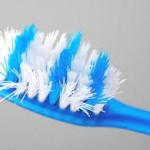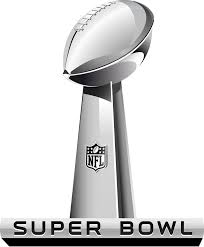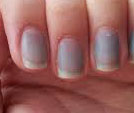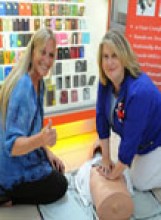Archive for January, 2015
Your Toothbrush Is Making You Sick
Posted by: | Comments There are more bacteria in the mouth than anywhere else in your body, and many of them end up on your toothbrush. These germs can include the flu virus, staph bacteria, yeast fungus, E. coli and the strep virus. Here they can multiple, grow and impact your health.
There are more bacteria in the mouth than anywhere else in your body, and many of them end up on your toothbrush. These germs can include the flu virus, staph bacteria, yeast fungus, E. coli and the strep virus. Here they can multiple, grow and impact your health.
Bathrooms are the perfect place for bacteria to grow — they are moist and steamy. In addition, it’s not helpful that most toothbrushes sit next to the toilet. Just like you wouldn’t store your dining plates and glasses next to your toilet, you shouldn’t do the same with your toothbrush. Every time you flush, an invisible plume of vapor is released from your toilet and can hang in the air for several minutes. These contaminated water vapors easily travel and can end up on surfaces that are close by, such as your toothbrush.
To stay in good health, put these helpful tips into practice:
- Wash your hands before and after brushing.
- Change your toothbrush every three months or whenever you have the flu or a cold. You should also change when the bristles become worn.
- Alternate between two brushes to make sure you use a completely dry brush.
- Store your brush away from the toilet, and close the lid before flushing.
- Do not share brushes and avoid storing toothbrushes together.
- Rinse your toothbrush thoroughly after every brush with hot water. For a more effective rinse, submerge your brush in hydrogen peroxide or alcohol-based mouthwash.
- Let your brush air-dry before putting a cap on the head or storing it away.
- Use a different tube of toothpaste if you or someone else in your family is sick.
Good oral hygiene not only helps in the care and appearance of your teeth, it can also have an effect on your heart, but that is for another article.
Risk of a Heart Attack During the Superbowl
Posted by: | Comments Many Emergency Rooms are familiar with the Superbowl Syndrome. High emotional sporting has shown to increase the number of heart attacks. Watching sporting events that have a high emotional effect can increase the release of adrenaline into your body. This rush of adrenaline can have serious detrimental effects upon those of us with previous or undiagnosed heart problems.
Many Emergency Rooms are familiar with the Superbowl Syndrome. High emotional sporting has shown to increase the number of heart attacks. Watching sporting events that have a high emotional effect can increase the release of adrenaline into your body. This rush of adrenaline can have serious detrimental effects upon those of us with previous or undiagnosed heart problems.
Best thing you can do to try and minimize your heart attack risk is:
- Try to remain as calm as possible during the big game. Root for your team, but try and keep the emotional aspect down to a minimum.
- Refrain or greatly reduce the amount of cigarettes or cigars you would normally consume. Smoking causes reduced circulation by narrowing the blood vessels (arteries) and puts a greater stress on your cardiovascular system.
- Many Superbowl parties put out extensive spreads of high calorie foods. Try to avoid overeating especially on chips, dips or other unhealthy foods. Overeating will cause an additional burden upon your digestive tract.
- Try to moderate your consumption of alcohol. Enjoy a drink or two during the game but try not to over consume and never drink and drive.
- If you begin to show signs of a heart attack such as feeling a tightness or heaviness in your chest, difficulty in breathing or sweating uncontrollably, do not
hesitate – call 911 immediately.
The key is moderation. You can still play an active part in the celebration of the Superbowl but try and not overdue it.
What Do Blue Fingernails Mean?
Posted by: | Comments Bluish color to your fingernails may be a sign of a lack of oxygen in your blood, due to coldness or possible disease. If normal color returns by warming your fingers or through massage, then the bluish color is due to cold. If not, then it could be due to several possible diseases.
Bluish color to your fingernails may be a sign of a lack of oxygen in your blood, due to coldness or possible disease. If normal color returns by warming your fingers or through massage, then the bluish color is due to cold. If not, then it could be due to several possible diseases.
- Asthma
- Pneumonia
- Emphysema
- Raynaud’s Phenomenon
- Carbon Monoxide Poisoning
- COPD (Chronic Obstructive Pulmonary Disease)
- Adult Respiratory Distress Syndrome
A simple non-invasive test by your doctor can be done to measure the oxygenation of your blood or more advance blood gases test can help determine the contributing factors to your blue fingernails.
If breathing difficulties are present, call 9-1-1 immediately. Otherwise see your physician soon to determine the underlying factors and a course of treatment.
Does Echinacea Work?
Posted by: | CommentsEchinacea is one of the best-selling herbal products in the U.S. Many people believe that Echinacea can help boost the immune system and reduce the length and severity of colds. In a recent health study published in the Annals of Internal Medicine, showed no significant reduction in the length or the severity of cold ailments with the use of Echinacea.
This study consisted with over 700 patient between the ages of 12 and 80. This blind study had individuals taking Echinacea, a placebo or no pills at all. In the end patients taking Echinacea did report a slight improvement of about 1/2 day in the duration of the symptoms. They also reported a slight reduction in the severity of the cold symptoms.
The researchers found that these slight patient improvements did not achieve enough of a statistical difference to prove the claim that Echinacea helped in the reduction or severity of a cold.
Although the benefits of Echinacea for the common cold are in doubt, the risks seem to be low and a small increase in white blood cell production has been documented. But there are some mild side effects to consider. The most common side effect is upset stomach. Some people have allergic reactions to Echinacea.
This can cause:
• Rashes
• Worsening asthma (if you have asthma)
• Anaphylaxis (a life-threatening emergency that can cause difficulty breathing)
If you or your loved one starts to experience any of these side effects, consult your physician . If loss of consciousness or difficulty in breathing occurs, call 911immediately.







